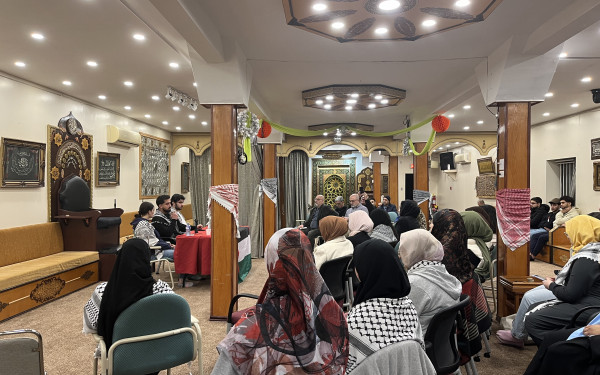After the Printemps Érable, the Automne Arabe
Tuition Hike Protests Lock Down Cairo University
CAIRO—The climate in Cairo this week felt much like that of the Université du Québec à Montréal a few months ago. Desert sun notwithstanding, picket lines and chained entrances enclosed the campus of the American University in Cairo.
Like their Quebec counterparts earlier this year, the Egyptian students are protesting tuition hikes. An administrative decision to increase tuition by seven per cent has sparked students to lock down the campus three times in two weeks, leading to a strike that’s been ongoing since Sept. 23.
“We decided that discussions with the administration were useless,” said AUC student Noaman Mohamad Khalid. “This is much more pressure.”
The hike in question would bring the cost of a 15-credit semester to roughly 59,000 LE or $9,500, resulting in students having to dish out approximately 4,843 LE or $780 more per year to attend school.
In response to the student-imposed lockdown, the university has cancelled classes until further notice and is currently in negotiations with students.
Unlike Quebec, not all post-secondary schools in Egypt are public institutions. As a result, this student movement is specific to AUC, as a private, non-profit institution.
“There is no leader, this is a collective movement,” said Khalid. The lack of an AUC equivalent to the Coalition large de l’Association pour une solidarité syndicale étudiante or Fédération étudiante universitaire du Québec directing student actions and demands has made it more difficult for students to mobilize.
“Thirty people went the extra mile to do the radical thing and now we have many people behind us,” said independent student activist Mohamed Hasan, known as Antak in the AUC community. He has been a key player in the protests.
After the first day of protest on Sept. 16, students opened an online petition to determine whether they would continue to block the school’s gates. The petition received approximately 3,000 signatures; the school has only roughly 6,800 students.
The university alleges that non-AUC students have signed the petition and that names were duplicated.
“There is also a petition that started [on Sept. 25] with almost 500 names to open the gates,” said AUC spokesperson Rehab Saad. “The problem is that both are online petitions that anyone can sign, so it’s hard to determine how accurate they are.”
The students have yet to hold an official vote to lock down the school. Unlike in Quebec, the suspension of classes has been forced onto the student population without any form of official consultation.
“If 3,000 students were in support, they wouldn’t need to close the gate because 3,000 students wouldn’t be attending [class],” pointed out Saad.
There is no firm sense of how the student body feels about these actions. The main means of gathering support has been through sharing the AUC Strike Facebook page, which jumped to over 3,000 likes in the past week.
The makeshift movement has also been criticized by the university and fellow students for having a myriad of reasons against the increase, in lieu of a focused one.
“We decided that discussions with the administration were useless. This is much more pressure.”
—American University in Cairo Student Noaman Mohamad Khalid on the Lockout Protest
“Canadians pay $12,000 at McGill University while Egyptians pay $22,000 at AUC—McGill is the best university in Canada,” reads one of the posters in Arabic.
While both figures are inaccurate, this echoes one of the main sentiments expressed by students concerning the disproportion between the cost and quality of the education they are receiving at AUC.
“It’s not fair for them to expect us to pay this much,” said mass communications student Norhanne Kamal.
Kamal was one of several students who stood linking arms in front of the gates as a call for peace after a violent altercation between security and students took place early last Thursday.
“We all agree and sympathize with the students,” said a member of the school’s gardening staff, who did not wish to give his name. “The administration is increasing tuition to increase their salaries.”
Since last year’s strike, where AUC’s student union supported the university staff in their protest for salary increases, much of the staff and students have maintained a strong sense of distrust towards the school’s administration.
This distrust, along with quality of education and unfairness, are the main concerns of the disjointed movement. Almost nowhere in the protest rhetoric is there mention of accessibility, which was the major point in the Quebec student protests.
“It’s my father’s decision how much he pays for my schooling,” said freshman Yostra El Khalifa. “Parents pay for school in almost all cases here, I would say.”
Almost all Egyptian students are financially dependent on their parents, typically living at home until marriage. For this reason, parents were a key party involved in negotiations over tuition increases during the budget meetings this summer.
This cultural difference means that many of the students are apathetic to university issues. However, others resent the patronization as well.
“This happened in Quebec,” yelled Antak to the crowd. “Believe it or not, they did it in Canada.”
But while picket lines and chained entrances may link both movements, appearances are insufficient to make AUC’s student protest a microcosm of what happened in Quebec. The distinct cultural and social issues behind the movement make the desert sun far from the greatest differentiating factor between the two.

_900_602_90.jpg)



2web_600_375_90_s_c1.jpg)

_1__600_375_90_s_c1.jpg)